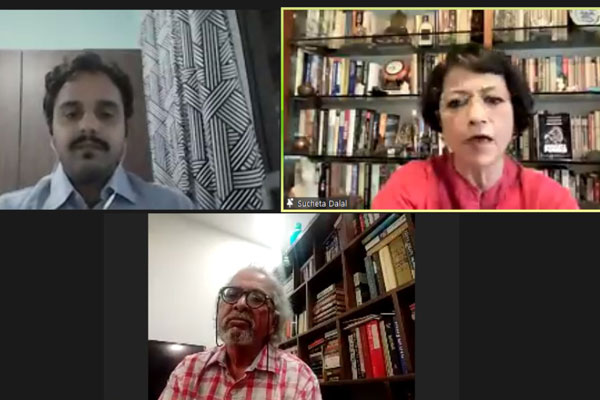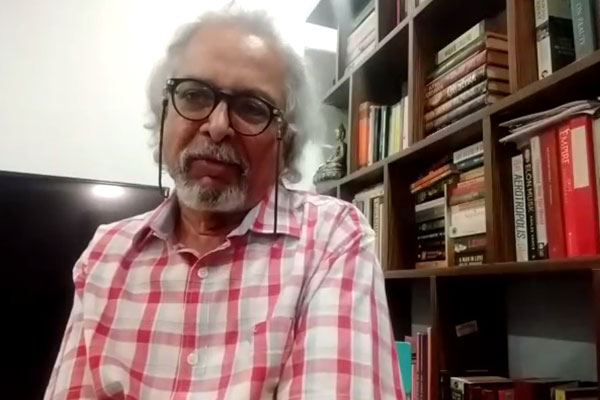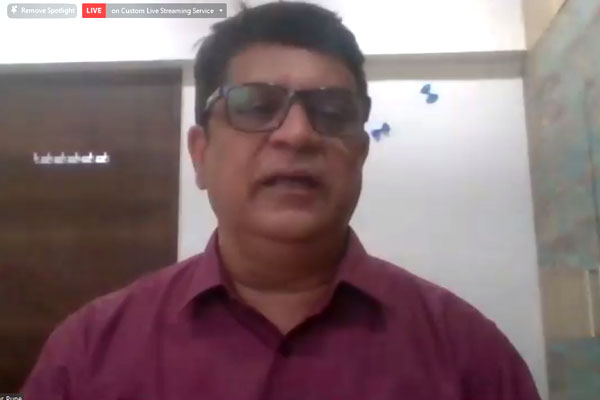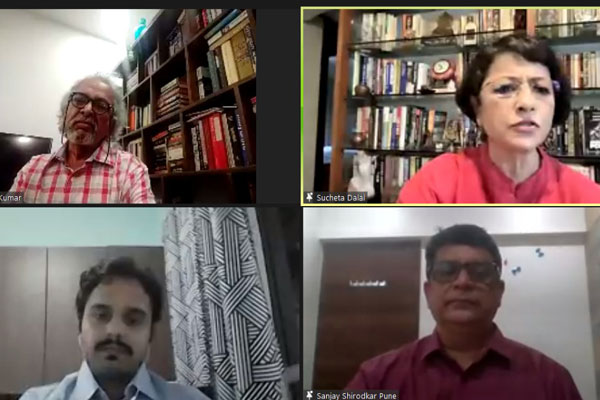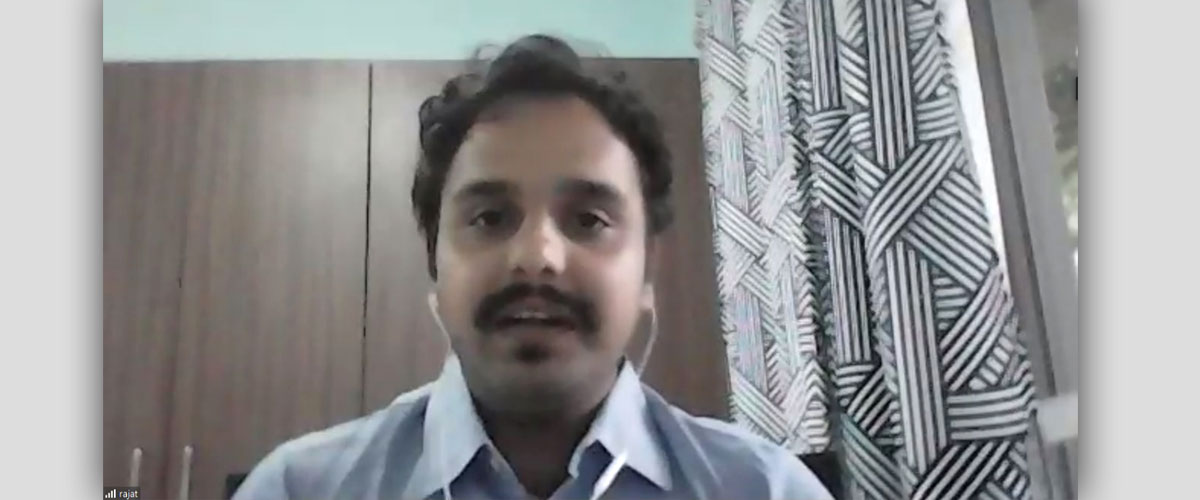
“As Napoleon said, the fundamental principle behind the law, should be that it should be simple enough for a peasant to read and concise enough to fit into his pocket. This is what encourages the citizens to follow laws. If laws are cumbersome and too many to be counted, how can we expect a truck driver to understand and interpret whether he is breaking any laws?” says Rajat Ubhaykar, while discussing the complex lives of truck drivers in India, at an event organised by Moneylife Foundation. The webinar was organised for discussion of Rajat’s book ‘Truck De India: A Hitchhiker’s Guide to India’.
Rajat had initially decided to take a 10,000kms hitchhiking journey across India with truckers, following his childhood fascination with trucks and a keen interest to understand a trucker’s way of life. “I started from Mumbai, after managing to find a truck driver, who would take me from Mumbai to Delhi. From there most of my trips were spontaneous and not specifically planned. As I went along, I begin to realise finer aspects of highways - places where I can seek out truckers, where they would be more amenable to having me along for a ride or for sharing their stories,” he says.
After a brief introduction explaining the background of the book, Rajat went on to talk about the many issues that plague the long-haul freight industry in India, as he had personally seen and experienced during his travels.
Starting with the training of truck drivers, Rajat says, “There was a recent survey by SaveLIFE Foundation, which found that 9 out of 10 truck drivers do not have any formal training at all. They are recruited through informal networks and known acquaintances. Truckers usually travel in pairs – Ustaad and Khalasi. The ustaad is in-charge of the truck while the khalasi is their helper. This khalasi is usually someone from their village or extended family, and that is how they are inducted into the trucking way of life. For the privilege of eventually getting to drive a truck, the khalasi has to essentially do the bidding of the ustaad, at a nominal salary.”
When there is such poor oversight and formal training of drivers is non-existent, it leads to poor driving skills amongst the younger generation of truckers.
Sharing his observations on the transportation industry, Rajat went on to say that the “industry is riddled with intermediaries; where one set of intermediaries will represent the person, who wants to get his goods transported, while another will represent the truckers, hiring them for a job and taking a share of the proceeds. This share of the earnings for the intermediaries is so high that the wages of a truck driver are severely affected and, in many cases, this has led to wage stagnation.”
In his opinion, the stranglehold of the many intermediaries is largely responsible for hampering progress and improvements through desperately needed policy reforms.
In his talk, Rajat also highlighted many other broader issues that are regularly faced by truckers, including risk of accidents due to either lack of training or sleep deprivation, lack of rest-stop facilities on highways, lack of respect among the public for the drivers and their profession and as well as corruption in the form of bribes.
While the book encompasses Rajat’s experiences from four-five years ago when he decided to take this journey, many technological advances have been made during this time which help to improve the lives of truckers.
However, veteran business journalist and logistics expert, Ramesh Kumar, who has closely followed the logistics industry in India, believes that even with the technological advances of smartphones, e-way bills and FASTag, many drivers are still digitally illiterate and such advances do not directly benefit them.
Sharing his thoughts on the advent of tech in the transportation industry, Pune-based activist Sanjay Shirodkar says, “FASTag has improved and sped up a journey, but only till the expressway, that is on six lane or eight lane highways, but not on two lane or four lane highways. Consider that if a fully loaded multi axle truck travels 1000kms in 24 hours, only then do they benefit from the journey. But unfortunately, because of toll barriers, which cause additional delays even with the implementation of FASTag, a truck’s journey is severely restricted in terms of distance travelled over a given period, resulting a less profitable journey.”
“Combination of e-way bills and FASTag, is wonderful in principle for seamless traffic. But a very huge problem that remains constant is corruption. Overloading and limited clarity on dimensions are very common problems, which are taken advantage of by authorities in extorting bribes from drivers,” says Mr Shirodkar, who had filed several right to information (RTI) applications and public interest litigations in courts, on the issues of toll loot.
Ambiguity in the rules and laws as they are understood by the drivers, opens a space for use of discretion which as Rajat termed as “the enemy of accountability and transparency,” he added.
Speaking about new app based innovative solutions such as Porter, which serves the purpose of intra-city transport, Rajat says, “Companies like BlackBuck are trying to directly connect the transporter to the consigner. This is a difficult task and there is till a lot of scope for improvement, to negate the negative effects of the many intermediaries. But the intermediary interests are so local and entrenched so deeply into the local political economy, that it has been difficult to displace them.”
“Rivigo for instance, is one of the few companies involved with long distance freight transport, which has introduced a new model called relay trucking, by which the driver changes every 200 or 250 kms. Turnaround times improve, utilisation of the truck improves and it makes a lot of logical sense, however implementation of this has been difficult,” he added.
Ramesh Kumar explained that the implementation of new systems such as relay trucking have been difficult, even with an improvement in efficiency due to an increase in the cost for the transport company per trip.
“There is a lack of trust in the freight business that has to be overcome. The fleet owner or consigner must trust the driver with lakhs of worst of goods, and this trust is generally provided by the intermediary. To replace this intermediary with just an app is very difficult as the stakes are too high,” explains Rajat.
According to Ramesh Kumar, while organisations such as AITWA (All India Transporter’s Welfare Association) and others are constantly trying to improve things, they are essentially functioning as local satraps and are not really on the same page on many issues. “There is no united front when the time comes to present their concerns and issues to the government,” he says.
Veeresh Malik, who himself has traveled on highways and driven a truck, presented a very positive outlook for the truckers and long-haul freight drivers, saying that there has been a huge demand for Indian qualified truck drivers overseas and in neighboring countries.
The consensus reached by Rajat and the panelists on the webinar, was that the present period could be the “darkest hour before the dawn” and that technological advances will eventually bring forth the much-required reform in the transportation industry.
Watch the video recording of this discussion here:


